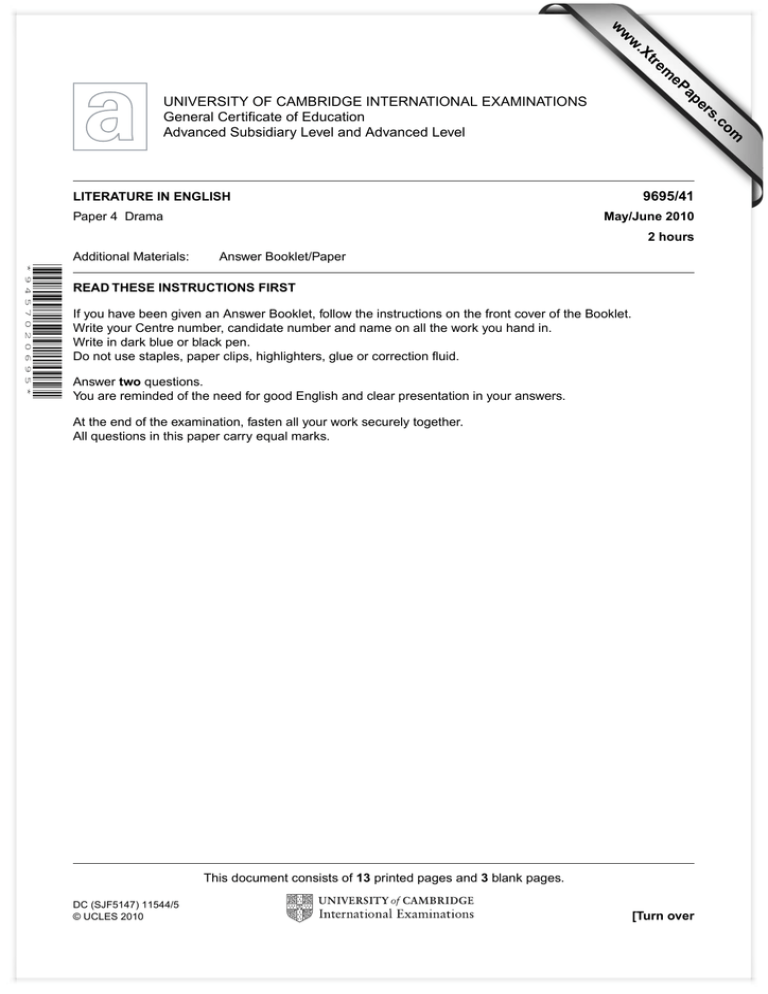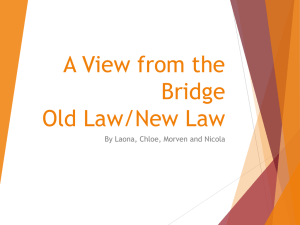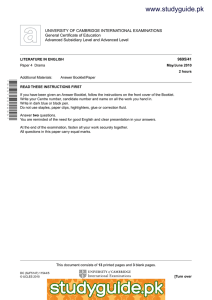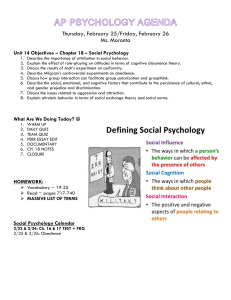
w
w
ap
eP
m
e
tr
.X
w
om
.c
s
er
UNIVERSITY OF CAMBRIDGE INTERNATIONAL EXAMINATIONS
General Certificate of Education
Advanced Subsidiary Level and Advanced Level
9695/41
LITERATURE IN ENGLISH
Paper 4 Drama
May/June 2010
2 hours
Additional Materials:
Answer Booklet/Paper
*9457020695*
READ THESE INSTRUCTIONS FIRST
If you have been given an Answer Booklet, follow the instructions on the front cover of the Booklet.
Write your Centre number, candidate number and name on all the work you hand in.
Write in dark blue or black pen.
Do not use staples, paper clips, highlighters, glue or correction fluid.
Answer two questions.
You are reminded of the need for good English and clear presentation in your answers.
At the end of the examination, fasten all your work securely together.
All questions in this paper carry equal marks.
This document consists of 13 printed pages and 3 blank pages.
DC (SJF5147) 11544/5
© UCLES 2010
[Turn over
2
PETER SHAFFER: Equus
1
Either
(a) Discuss the role and contribution of Frank and Dora Strang to the play’s dramatic
action.
Or
(b) With close reference to its language and action, discuss the importance of this
extract to the play as a whole.
Dysart [gently]: What was it? You couldn’t? Though you wanted to very much?
Alan [to DYSART]: I couldn’t … see her.
Dysart: What do you mean?
Alan [to DYSART]: Only Him. Every time I kissed her – He was in the way.
Dysart: Who?
[Alan turns on his back.]
Alan [to DYSART]: You know who! … When I touched her, I felt Him. Under me …
His side, waiting for my hand … His flanks … I refused him. I looked. I
looked right at her … and I couldn’t do it. When I shut my eyes, I saw Him
at once. The streaks on his belly … [With more desperation.] I couldn’t feel
her flesh at all! I wanted the foam off his neck. His sweaty hide. Not flesh.
Hide! Horse-hide! … Then I couldn’t even kiss her.
[JILL sits up.]
Jill:
What is it?
Alan [dodging her hand]: No!
[He scrambles up and crouches in the corner against the rails, like a little
beast in a cage.]
Jill:
Alan!
Alan:
Stop it!
[JILL gets up.]
Jill:
It’s all right … It’s all right … Don’t worry about it. It often happens – honest
… There’s nothing wrong. I don’t mind, you know … I don’t at all.
[He dashes past her downstage.]
Alan, look at me … Alan? … Alan!
[He collapses again by the rail.]
Alan:
Get out! …
Jill:
What?
Alan [soft]: Out!
Jill:
There’s nothing wrong; believe me! It’s very common.
Alan:
Get out!
[He snatches up the invisible pick.]
GET OUT!
Jill:
Put that down!
Alan:
Leave me alone!
Jill:
Put that down, Alan. It’s very dangerous. Go on, please – drop it.
[He ‘drops’ it, and turns from her.]
Alan:
You ever tell anyone. Just you tell …
Jill:
Who do you think I am? … I’m your friend – Alan …
[She goes towards him.]
Listen: you don’t have to do anything. Try to realize that. Nothing at all. Why
don’t we just lie here together in the straw. And talk.
Alan [low]: Please …
Jill:
Just talk.
Alan:
Please!
Jill:
All right, I’m going … Let me put my clothes on first.
[She dresses, hastily.]
Alan:
You tell anyone! … Just tell and see …
© UCLES 2010
9695/41/M/J/10
5
10
15
20
25
30
35
40
45
3
Jill:
© UCLES 2010
Oh, stop it! … I wish you could believe me. It’s not in the least important.
[Pause.]
Anyway, I won’t say anything. You know that. You know I won’t …
[Pause. He stands with his back to her.]
Good night, then, Alan … I wish – I really wish –
[He turns on her, hissing. His face is distorted – possessed.
In horrified alarm she turns – fumbles the door open – leaves the barn –
shuts the door hard behind her, and dashes up the tunnel out of sight, past
the barely visible figure of NUGGET.]
Act Two
9695/41/M/J/10
50
55
[Turn over
4
WILLIAM SHAKESPEARE: Twelfth Night
2
Either
(a) Discuss the presentation and significance of different kinds of madness in Twelfth
Night.
Or
(b) With close reference to the extract below, explore the dramatic and thematic
significance of this episode.
Enter Olivia and Attendants.
Duke: Here comes the Countess; now heaven walks on earth.
But for thee, fellow – fellow, thy words are madness.
Three months this youth hath tended upon me –
But more of that anon. Take him aside.
Olivia: What would my lord, but that he may not have,
Wherein Olivia may seem serviceable?
Cesario, you do not keep promise with me.
Viola: Madam?
Duke: Gracious Olivia –
Olivia: What do you say, Cesario? Good my lord –
Viola: My lord would speak; my duty hushes me.
Olivia: If it be aught to the old tune, my lord,
It is as fat and fulsome to mine ear
As howling after music.
Duke:
Still so cruel?
Olivia: Still so constant, lord.
Duke: What, to perverseness? You uncivil lady,
To whose ingrate and unauspicious altars
My soul the faithfull’st off’rings hath breath’d out
That e’er devotion tender’d! What shall I do?
Olivia: Even what it please my lord, that shall become him.
Duke: Why should I not, had I the heart to do it,
Like to the Egyptian thief at point of death,
Kill what I love? – a savage jealousy
That sometime savours nobly. But hear me this:
Since you to non-regardance cast my faith,
And that I partly know the instrument
That screws me from my true place in your favour,
Live you the marble-breasted tyrant still;
But this your minion, whom I know you love,
And whom, by heaven I swear, I tender dearly,
Him will I tear out of that cruel eye
Where he sits crowned in his master’s spite.
Come, boy, with me; my thoughts are ripe in mischief:
I’ll sacrifice the lamb that I do love
To spite a raven’s heart within a dove.
Viola: And I, most jocund, apt, and willingly,
To do you rest, a thousand deaths would die.
Olivia: Where goes Cesario?
Viola:
After him I love.
More than I love these eyes, more than my life,
More, by all mores, than e’er I shall love wife.
If I do feign, you witnesses above
Punish my life for tainting of my love!
Olivia: Ay me, detested! How am I beguil’d!
Viola: Who does beguile you? Who does do you wrong?
© UCLES 2010
9695/41/M/J/10
5
10
15
20
25
30
35
40
45
5
Olivia:
Duke:
Olivia:
Duke:
Olivia:
Duke:
Viola:
Hast thou forgot thyself? Is it so long?
Call forth the holy father.
Come, away!
Whither, my lord? Cesario, husband, stay.
Husband?
Ay, husband; can he that deny?
Her husband, sirrah?
No, my lord, not I.
[Exit an Attendant.
50
55
Act 5, Scene 1
© UCLES 2010
9695/41/M/J/10
[Turn over
6
WILLIAM SHAKESPEARE: Henry IV, Part 1
3
Either
(a) ‘A son who is the theme of honour’s tongue;
Amongst a grove, the very straightest plant.’
To what extent would you agree with Henry IV’s assessment of Hotspur?
Or
(b) With close reference to language, compare and contrast the two images of Prince
Henry that emerge from the following extract.
Poins:
Prince:
Poins:
Prince:
Poins:
Prince:
Poins:
Prince:
Poins:
Prince:
© UCLES 2010
Now, my good sweet honey lord, ride with us to-morrow. I have
a jest to execute that I cannot manage alone. Falstaff, Bardolph,
Peto, and Gadshill, shall rob those men that we have already
waylaid; yourself and I will not be there; and when they have the
booty, if you and I do not rob them, cut this head off from my
shoulders.
How shall we part with them in setting forth?
Why, we will set forth before or after them, and appoint them a
place of meeting, wherein it is at our pleasure to fail; and then
will they adventure upon the exploit themselves; which they shall
have no sooner achieved but we’ll set upon them.
Yea, but ’tis like that they will know us by our horses, by our
habits, and by every other appointment, to be ourselves.
Tut! our horses they shall not see – I’ll tie them in the wood; our
vizards we will change after we leave them; and, sirrah, I have
cases of buckram for the nonce, to immask our noted outward
garments.
Yea, but I doubt they will be too hard for us.
Well, for two of them, I know them to be as true-bred cowards
as ever turn’d back; and for the third, if he fight longer than he
sees reason, I’ll forswear arms. The virtue of this jest will be the
incomprehensible lies that this same fat rogue will tell us when we
meet at supper: how thirty, at least, he fought with; what wards,
what blows, what extremities he endured; and in the reproof of
this lives the jest.
Well, I’ll go with thee. Provide us all things necessary, and meet
me to-morrow night in Eastcheap; there I’ll sup. Farewell.
Farewell, my lord.
[Exit Poins.
I know you all, and will awhile uphold
The unyok’d humour of your idleness;
Yet herein will I imitate the sun,
Who doth permit the base contagious clouds
To smother up his beauty from the world,
That, when he please again to be himself,
Being wanted, he may be more wond’red at
By breaking through the foul and ugly mists
Of vapours that did seem to strangle him.
If all the year were playing holidays,
To sport would be as tedious as to work;
But when they seldom come, they wish’d-for come,
And nothing pleaseth but rare accidents.
So, when this loose behaviour I throw off
And pay the debt I never promised,
By how much better than my word I am,
By so much shall I falsify men’s hopes;
9695/41/M/J/10
5
10
15
20
25
30
35
40
45
7
And, like bright metal on a sullen ground,
My reformation, glitt’ring o’er my fault,
Shall show more goodly and attract more eyes
Than that which hath no foil to set it off.
I’ll so offend to make offence a skill,
Redeeming time when men think least I will.
50
[Exit.
Act 1, Scene 2
© UCLES 2010
9695/41/M/J/10
[Turn over
8
TOM STOPPARD: Rosencrantz and Guildenstern Are Dead
4
Either
(a) Discuss Stoppard’s treatment of the theme of death in Rosencrantz and Guildenstern
Are Dead.
Or
(b) With close reference to the passage below, show what dramatic effects Stoppard
creates by having his own characters react to Shakespeare’s lines.
Gertrude: Good [fractional suspense] gentlemen … [They both bow.]
He hath much talked of you,
Content removed due to copyright restrictions
Guil [the nursemaid] There! … and we’ll soon be home and dry … and high and dry
… [rapidly] Has it ever happened to you that all of a sudden and for no
reason at all you haven’t the faintest idea how to spell the word – ‘wife’
– or ‘house’ – because when you write it down you just can’t remember
ever having seen those letters in that order before …?
Act 1
© UCLES 2010
9695/41/M/J/10
9
Content removed due to copyright restrictions
© UCLES 2010
9695/41/M/J/10
[Turn over
10
ARTHUR MILLER: A View from the Bridge
5
Either
(a) Discuss the role and dramatic significance of Beatrice and her marriage to Eddie.
Or
(b) How, and with what effects, does Miller dramatise a clash of cultural values and
attitudes in this episode from the play?
There is a pause of darkness before the lights rise, on the reception room of a
prison. MARCO is seated; ALFIERI, CATHERINE, and RODOLPHO standing.]
Alfieri:
Rodolpho:
Alfieri:
I’m waiting, Marco, what do you say?
Marco never hurt anybody.
I can bail you out until your hearing comes up. But I’m not going to do it,
you understand me? Unless I have your promise. You’re an honourable
man, I will believe your promise. Now what do you say?
Marco:
In my country he would be dead now. He would not live this long.
Alfieri:
All right, Rodolpho – you come with me now.
Rodolpho: No! Please, Mister. Marco – promise the man. Please, I want you to
watch the wedding. How can I be married and you’re in here? Please,
you’re not going to do anything; you know you’re not.
[MARCO is silent.]
Catherine [kneeling left of MARCO]: Marco, don’t you understand? He can’t bail
you out if you’re gonna do something bad. To hell with Eddie. Nobody
is gonna talk to him again if he lives to a hundred. Everybody knows
you spit in his face, that’s enough, isn’t it? Give me the satisfaction – I
want you at the wedding. You got a wife and kids, Marco. You could be
workin’ till the hearing comes up, instead of layin’ around here.
Marco [to ALFIERI]: I have no chance?
Alfieri [crosses to behind MARCO]: No, Marco. You’re going back. The hearing is a
formality, that’s all.
Marco:
But him? There is a chance, eh?
Alfieri:
When she marries him he can start to become an American. They
permit that, if the wife is born here.
Marco [looking at RODOLPHO]: Well – we did something. [He lays a palm on
RODOLPHO’s arm and RODOLPHO covers it.]
Rodolpho: Marco, tell the man.
Marco [pulling his hand away]: What will I tell him? He knows such a promise is
dishonourable.
Alfieri:
To promise not to kill is not dishonourable.
Marco [looking at ALFIERI]: No?
Alfieri:
No.
Marco [gesturing with his head – this is a new idea]: Then what is done with such a
man?
Alfieri:
Nothing. If he obeys the law, he lives. That’s all.
Marco [rises, turns to ALFIERI]: The law? All the law is not in a book.
Alfieri:
Yes. In a book. There is no other law.
Marco [his anger rising]: He degraded my brother. My blood. He robbed my children,
he mocks my work. I work to come here, mister!
Alfieri:
I know, Marco –
Marco:
There is no law for that? Where is the law for that?
Alfieri:
There is none.
Marco [shaking his head, sitting]: I don’t understand this country.
Alfieri:
Well? What is your answer? You have five or six weeks you could work.
Or else you sit here. What do you say to me?
Marco [lowers his eyes. It almost seems he is ashamed]: All right.
© UCLES 2010
9695/41/M/J/10
5
10
15
20
25
30
35
40
45
11
Alfieri:
You won’t touch him. This is your promise.
[Slight pause.]
Marco:
Maybe he wants to apologize to me.
[MARCO is staring away. ALFIERI takes one of his hands.]
Alfieri:
This is not God, Marco. You hear? Only God makes justice.
Marco:
All right.
Alfieri [nodding, not with assurance]: Good! Catherine, Rodolpho, Marco, let us go.
[CATHERINE kisses RODOLPHO and MARCO, then kisses ALFIERI’s
hand]
Catherine: I’ll get Beatrice and meet you at the church.
[She leaves quickly.
MARCO rises. RODOLPHO suddenly embraces him. MARCO pats him
on the back and RODOLPHO exits after CATHERINE. MARCO faces
ALFIERI.]
Alfieri:
Only God, Marco.
[MARCO turns and walks out. ALFIERI with a certain processional
tread leaves the stage. The lights dim out.]
Act Two
© UCLES 2010
9695/41/M/J/10
50
55
60
[Turn over
12
OSCAR WILDE: The Importance of Being Earnest
6
Either
(a) How, and with what effects, does Wilde satirise education and learning in The
Importance of Being Earnest?
Or
(b) With particular attention to the extract below, show how Wilde presents the
relationship between Jack and Algernon.
Jack:
Cecily! What on earth do you mean? What do you mean, Algy, by Cecily!
I don’t know any one of the name of Cecily.
[Enter LANE.]
Algernon: Bring me that cigarette case Mr Worthing left in the smoking-room the
last time he dined here.
Lane:
Yes, sir.
[LANE goes out.]
Jack:
Do you mean to say you have had my cigarette case all this time? I wish
to goodness you had let me know. I have been writing frantic letters to
Scotland Yard about it. I was very nearly offering a large reward.
Algernon: Well, I wish you would offer one. I happen to be more than usually hard
up.
Jack:
There is no good offering a large reward now that the thing is found.
[Enter LANE with the cigarette case on a salver. ALGERNON takes it at
once. LANE goes out.]
Algernon: I think that is rather mean of you, Ernest, I must say. [Opens case and
examines it.] However, it makes no matter, for, now that I look at the
inscription inside, I find that the thing isn’t yours after all.
Jack:
Of course it’s mine. [Moving to him.] You have seen me with it a hundred
times, and you have no right whatsoever to read what is written inside. It
is a very ungentlemanly thing to read a private cigarette case.
Algernon: Oh! it is absurd to have a hard and fast rule about what one should read
and what one shouldn’t. More than half of modern culture depends on
what one shouldn’t read.
Jack:
I am quite aware of the fact, and I don’t propose to discuss modern
culture. It isn’t the sort of thing one should talk of in private. I simply want
my cigarette case back.
Algernon: Yes; but this isn’t your cigarette case. This cigarette case is a present
from someone of the name of Cecily, and you said you didn’t know
anyone of that name.
Jack:
Well, if you want to know, Cecily happens to be my aunt.
Algernon: Your aunt!
Jack:
Yes. Charming old lady she is, too. Lives at Tunbridge Wells. Just give it
back to me, Algy.
Algernon [retreating to back of sofa]: But why does she call herself little Cecily if she
is your aunt and lives at Tunbridge Wells? [Reading.] ‘From little Cecily
with her fondest love.’
Jack [moving to sofa and kneeling upon it]: My dear fellow, what on earth is there
in that? Some aunts are tall, some aunts are not tall. That is a matter
that surely an aunt may be allowed to decide for herself. You seem to
think that every aunt should be exactly like your aunt! That is absurd. For
Heaven’s sake give me back my cigarette case. [Follows ALGERNON
round the room.]
Algernon: Yes. But why does your aunt call you her uncle? ‘From little Cecily, with
her fondest love to her dear Uncle Jack.’ There is no objection, I admit,
to an aunt being a small aunt, but why an aunt, no matter what her size
may be, should call her own nephew her uncle, I can’t quite make out.
© UCLES 2010
9695/41/M/J/10
5
10
15
20
25
30
35
40
45
13
Besides, your name isn’t Jack at all; it is Ernest.
Jack:
It isn’t Ernest; it’s Jack.
Algernon: You have always told me it was Ernest. I have introduced you to every
one as Ernest. You answer to the name of Ernest. You look as if your
name was Ernest. You are the most earnest-looking person I ever saw
in my life. It is perfectly absurd your saying that your name isn’t Ernest.
It’s on your cards. Here is one of them. [Taking it from case.] ‘Mr Ernest
Worthing, B.4, The Albany.’ I’ll keep this as a proof that your name is
Ernest if ever you attempt to deny it to me, or to Gwendolen, or to anyone
else. [Puts the card in his pocket.]
Jack:
Well, my name is Ernest in town and Jack in the country, and the
cigarette case was given to me in the country.
Algernon: Yes, but that does not account for the fact that your small Aunt Cecily,
who lives at Tunbridge Wells, calls you her dear uncle. Come, old boy,
you had much better have the thing out at once.
Jack:
My dear Algy, you talk exactly as if you were a dentist. It is very vulgar
to talk like a dentist when one isn’t a dentist. It produces a false
impression.
Act 1
© UCLES 2010
9695/41/M/J/10
50
55
60
65
14
BLANK PAGE
© UCLES 2010
9695/41/M/J/10
15
BLANK PAGE
© UCLES 2010
9695/41/M/J/10
16
BLANK PAGE
Copyright Acknowledgements:
Question 1
Question 4
Question 5
© Peter Shaffer; Equus; Penguin Books Ltd; 1984.
© Tom Stoppard; Rosencrantz & Guildenstern are Dead; pp.27-29; Faber & Faber; 2000.
© Arthur Miller; A View from the Bridge; Penguin Books; 2000; © 1952; Arthur Miller. Reproduced by permission. All rights reserved.
Permission to reproduce items where third-party owned material protected by copyright is included has been sought and cleared where possible. Every
reasonable effort has been made by the publisher (UCLES) to trace copyright holders, but if any items requiring clearance have unwittingly been included, the
publisher will be pleased to make amends at the earliest possible opportunity.
University of Cambridge International Examinations is part of the Cambridge Assessment Group. Cambridge Assessment is the brand name of University of
Cambridge Local Examinations Syndicate (UCLES), which is itself a department of the University of Cambridge.
© UCLES 2010
9695/41/M/J/10







